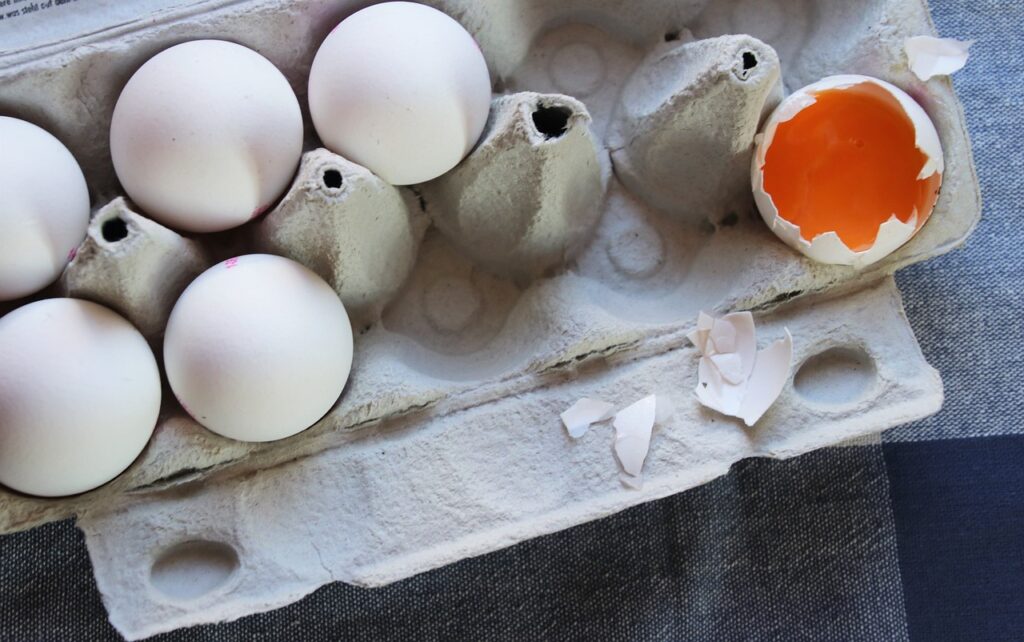Introduction
Eggs are a staple in most households, yet there’s widespread confusion around how long fresh eggs can last without refrigeration. Whether you’re a homesteader, survivalist, or simply buying farm-fresh eggs, understanding non-refrigerated storage is critical. In this article, we’ll unpack how to store fresh eggs safely without refrigeration, how long they last, and 15 essential tips to preserve their freshness using natural methods.

Image by Erika Varga from Pixabay
Why Egg Storage Matters
Storing eggs correctly isn’t just about convenience—it’s about food safety and maximizing shelf life. Eggs that aren’t stored properly can harbor bacteria like Salmonella, which can lead to foodborne illness. On the flip side, if you’re dealing with unwashed, farm-fresh eggs, you might be surprised by how long they can last without chilling—safely.
The Science Behind Egg Freshness
Understanding the Egg’s Natural Coating
Freshly laid eggs come with a protective coating called the “bloom” or cuticle. This invisible layer seals the porous shell and acts as nature’s own barrier against bacteria and moisture loss.
Factors Affecting Egg Longevity Without Refrigeration
- Temperature Fluctuations: High temps reduce shelf life.
- Humidity: Too much moisture = bacterial growth.
- Air Exposure: Speeds up aging and spoilage.
- Washing: Removes the bloom and drastically shortens shelf life.

Image by Peggychoucair from Pixabay
How Long Do Fresh Eggs Last Without Refrigeration?
USDA Guidelines vs. Natural Practices
- USDA Recommendation: Refrigerate eggs immediately after purchase.
- Natural Storage (Unwashed eggs): Can last 2 to 3 weeks at room temperature (68°F or lower), and even longer with proper preservation.
Room Temperature Duration by Country
| Country | Common Practice | Shelf Life Without Refrigeration |
| USA | Washed & Refrigerated | 1–2 hours max unrefrigerated |
| UK | Unwashed, room temp | 2–3 weeks |
| France | Room temp storage | 3 weeks |
| Philippines | No refrigeration | Up to 4 weeks (local climate-dependent) |
Farm Fresh vs. Store-Bought: What’s the Difference?
- Farm Fresh Eggs (unwashed): Last longer unrefrigerated due to the intact bloom.
- Store-Bought Eggs (washed): Require refrigeration because the protective coating is removed during processing.
How to Store Fresh Eggs Without Refrigeration
The Role of the Bloom
If you’re collecting eggs from backyard chickens, don’t wash them. Preserve the bloom and store them in a cool, dry place.
Ideal Storage Conditions
- Temperature: 50–68°F (10–20°C)
- Humidity: ~75%
- Storage Method: Pointy end down in a carton or tray

Top 10 Traditional Preservation Methods
| Method | Description |
| Lime Water | Water glassing using pickling lime |
| Mineral Oil | Creates an artificial bloom |
| Salt Packing | Dehydrates and preserves eggs |
| Wood Ash | Traditional method used in Africa |
| Clay Coating | Used in ancient China |
| Rice Hull Storage | Absorbs moisture, keeps eggs dry |
| Beeswax | Natural sealer |
| Refrigerator Root Cellars | Hybrid off-grid solution |
| Paraffin Wax | Creates airtight seal |
| Isinglass (fish gelatin) | Historic method in 19th century Europe |
Signs That Eggs Have Gone Bad
Visual and Smell Tests
- Look: Cracks or discoloration
- Smell: Rotten sulfuric odor = spoiled
Float Test Explained
Place the egg in a bowl of water:
- Sinks & lays flat: Fresh
- Stands upright: Getting old
- Floats: Bad, discard immediately
Safety Concerns and Salmonella Risks
Salmonella risk is generally low in unwashed eggs but increases if the shell is damaged or compromised. Always:
- Discard cracked eggs
- Store away from strong odors
- Avoid washing until right before use
Can You Extend Freshness Naturally?
Mineral Oil Coating
Rub a small amount of food-grade mineral oil over each egg to mimic the bloom.
Lime Water Storage (Water Glassing)
A mix of calcium hydroxide and water can preserve eggs up to 12 months. Always use clean, fresh eggs and a sanitized container.
Regional Egg Storage Practices
🇪🇺 Europe vs. 🇺🇸 U.S. Regulations
- Europe: Eggs are sold unwashed and unrefrigerated.
- USA: Eggs are washed and must be refrigerated due to lost bloom.
Off-Grid and Homesteader Techniques
- Cool pantries, root cellars, and earthen pots are commonly used.
- Some store eggs in buckets of bran or straw to extend freshness.
Common Myths About Egg Storage
- Myth: All eggs need refrigeration – Not true for unwashed eggs.
- Myth: The float test works 100% of the time – It’s reliable but not foolproof.
- Myth: Washing eggs makes them safer – Actually increases risk of contamination.
FAQs
Q1: Can I eat an egg that’s been left out overnight?
A: If it’s unwashed and farm fresh, yes—it’s generally safe. If store-bought, no.
Q2: How long can unwashed eggs last at 60°F?
A: About 3 weeks, possibly longer if stored correctly.
Q3: Is it safe to store eggs in the pantry?
A: Yes, if they are unwashed and your pantry stays under 70°F.
Q4: What’s the best way to preserve eggs naturally?
A: Lime water storage (water glassing) is the most effective for long-term storage.
Q5: Do eggs spoil faster in humid environments?
A: Yes, high humidity can lead to bacterial growth and spoilage.
Q6: Can I re-coat washed eggs with oil to extend freshness?
A: Yes, using mineral oil can help, but it’s not as effective as preserving the original bloom.

Image by 🌸♡💙♡🌸 Julita 🌸♡💙♡🌸 from Pixabay
Conclusion
So, how long do fresh eggs last without refrigeration? If they’re unwashed and stored properly, up to 3 weeks or longer. Traditional methods like mineral oil coating or lime water storage can extend this even further, ensuring food security without the fridge.
Understanding the natural design of eggs and regional practices gives you more freedom—and peace of mind—whether you’re living off-grid or just love farm-to-table living.
